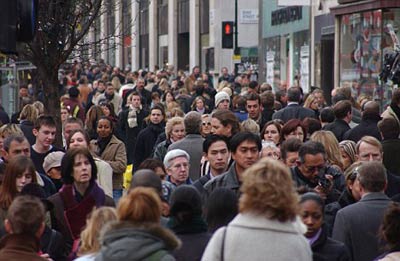|
 Population explosion: There will be 7 billion people on earth by the autumn, experts predict. |
|
A little over a decade ago, the world’s population stood at 6billion. By the end of October, it will reach 7 billion. With five babies being born every second, 78 million people are added to the global community each year. The population was fewer than 1billion in 1800, 3 billion in 1960 and 6 billion as recently as 1999. According to the United Nations, the next landmark statistic will be 8 billion in 2025. Much of the dramatic increase can be accounted for by the world’s poorest nations, which are expected to double their numbers over the next decade. ‘With the population still growing by about 80 million each year, it’s hard not to be alarmed,’ said Robert Kunzig, author of an article entitled ‘7 Billion’ in National Geographic magazine. ‘Right now on Earth, water tables are falling, soil is eroding, glaciers are melting, and fish stocks are vanishing. Close to a billion people go hungry each day.’ Researchers say the world’s population will level off at about 9billion in the middle of the century. ‘How we’re going to feed 9 billion people by 2050 is a daunting question,’ Mr Kunzig said. There are currently 1.8 billion young people, aged between ten and 24. Demographers say the average couple needs to have 2.1 children to keep the population steady. In Western Europe, that number had dropped to 1.4 by the late 1990s. In parts of Europe and East Asia, there is growing concern that there will not be enough young people to support the growing number of retirees. (Read by Nelly Min. Nelly Min is a journalist at the China Daily Website.) (Agencies) |
十多年前,世界人口達(dá)到了60億。而到今年十月底,這個(gè)數(shù)字將會(huì)變成70億。 現(xiàn)在地球上每一秒都有5個(gè)嬰兒出生,每年全球人口增加7800萬(wàn)。 1800年,全球人口還不足10億,1960年全球人口達(dá)到了30億,而1999年達(dá)到了60億。 據(jù)聯(lián)合國(guó)預(yù)測(cè),下一個(gè)里程碑式的數(shù)字將出現(xiàn)在2025年,屆時(shí)全球人口會(huì)達(dá)到80億。 這些急劇增加的人口中,很大一部分來(lái)自世界上最窮的國(guó)家,預(yù)計(jì)他們的人口在下一個(gè)十年將會(huì)成倍增加。 羅伯特?昆齊希寫(xiě)了一篇題為《70億》的文章,發(fā)表在《國(guó)家地理》雜志上。他說(shuō),“全球每年增加約8000萬(wàn)人口,很難不讓人感到恐慌。” “在我們今天的地球上,地下水位不斷下降,土壤受到侵蝕,冰川正在融化,魚(yú)群種類(lèi)不斷減少,還有近10億人口每天都在挨餓。” 研究人員稱(chēng),到本世紀(jì)中期,全球人口將會(huì)穩(wěn)定在90億左右。 昆齊希說(shuō):“到2050年,我們?cè)趺答B(yǎng)活90億人口,這是一個(gè)令人頭疼的問(wèn)題。” 現(xiàn)在地球上有18億10到24歲的年輕人。人口學(xué)家稱(chēng),要保持人口穩(wěn)定,平均每對(duì)夫婦要生養(yǎng)2.1個(gè)孩子。而在西歐,上世紀(jì)90年代末,平均每對(duì)夫婦只生育1.4個(gè)孩子。 在歐洲部分地區(qū)和東亞,人們也越來(lái)越擔(dān)心,年輕人將不足以填補(bǔ)退休人員增多造成的勞動(dòng)力短缺。 相關(guān)閱讀 專(zhuān)家:2050年地球或?qū)⒚婺咳?/a> 印度開(kāi)展人口普查 總?cè)丝诳蛇_(dá)12億 預(yù)測(cè):2050年英國(guó)將成歐洲人口最多國(guó)家 (中國(guó)日?qǐng)?bào)網(wǎng)英語(yǔ)點(diǎn)津 實(shí)習(xí)生高美 編輯:陳丹妮) |
|
Vocabulary: water table: the level at and below which water is found in the ground(地下水位) glacier: a large mass of ice, formed by snow on mountains, that moves very slowly down a valley(冰川) level off: (經(jīng)過(guò)急劇的漲落后)保持平穩(wěn)發(fā)展 daunting: seeming difficult to deal with in anticipation; intimidating(令人怯步的;使人氣餒的) |
